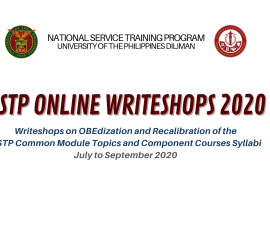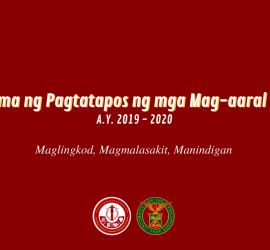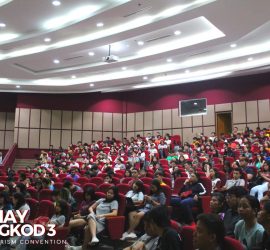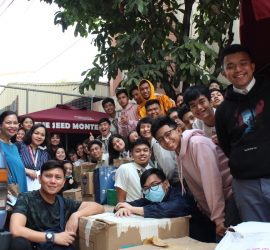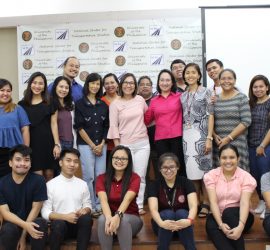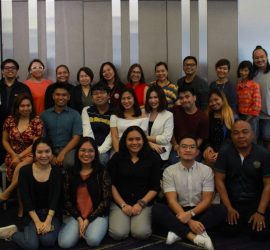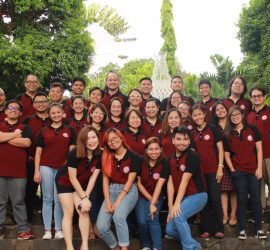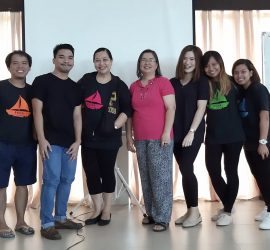A sequel webinar to National Service in the New Normal, Reimagining Community Engagement: A Webinar on NSTP Community Engagement Projects,was hosted by the NSTP Diliman Office last December 7, 2020 via Zoom and YouTube livestream. Featuring five resource speakers from public service and community development sectors, the free webinar aimed to provide participants with valuable training and insights essential for planning and implementing community engagement projects considering the restrictions posed by the pandemic. NSTP Diliman Director Dr. Jonalou Labor formally opened the event welcoming more than 1,000 NSTP implementers and students representing 180 higher education institutions (HEIs) in the country. Dr. Labor shared that UP Diliman, consistent with UP’s mandate to become a public service university, has provided knowledge products and instructional materials for NSTP Common Module and Component Courses Topics. He pointed out that these materials may be accessed through the NSTP Diliman YouTube Channel. He also encouraged the attendees to visit the NSTP Diliman website to access the Serbisyong Tatak UP radio episodes, also a source of reliable information on NSTP content. He reiterated that UP, as a national university, would continue to extend all the help that it could to NSTP implementing units around the country to provide the best NSTP program possible. After his opening remarks, Dr. Labor introduced Ms. Francelline Jimenez, a development worker and the Project Manager of Increasing the Resilience towards Natural Hazards (INCREASE) Project for CARE Philippines. In her talk about the Fundamentals of Remote and Blended Community Engagement, she defined remote and blended community engagement. She emphasized that with our current situation, using digital platforms in doing community engagement is inevitable and it is critical to know the purpose of our project and the context of the community we are engaging with in order to decide on the best type of platform to use. Mr. John Cedric Pineda, Program Manager for Community Engagement and Life Skills for Teach for the Philippines, the second speaker, discussed the Characteristics of Effective Remote and Blended Community Engagement. He enumerated three main factors that affect the success of remote and community engagement: accessibility, inclusivity, and relevance. At the end, he highlighted […]
NEWS
The NSTP Diliman Office launched a series of Online Writeshops from July to September 2020 in order to equip its implementers for the transition to a remote mode of course delivery. The Office has been consistently conducting course improvement and redesigning activities for the past years through several trainings and writeshops, only this time, the writeshops participants – NSTP instructors and coordinators from different implementing units – had to migrate to and explore different means of remote and online collaboration platforms. The NSTP Online Writeshops aimed to finalize the OBEdized Common Module Topics Syllabi, to craft OBEdized Component Courses Syllabi, and to devise recalibrated versions of the OBEdized Common Module and Component Courses Syllabi for Remote Learning. The online writeshops were conducted through group-led regular online meeting sessions, by continuous meetings and presentation of outputs, and with real-time document collaborations through Google Workspace. Dr. Rosella Torrecampo, NSTP Diliman Office’s resource person and consultant for its curriculum development activities, guided the groups in their writing and revision process. The Phase 1 of the Online Writeshops which ran from July 27-August 24, 2020 was focused on the NSTP Common Module Topics. This module lays the foundation for NSTP Diliman courses as these are the set of topics discussed in all NSTP classes before students carry out community engagement projects in CWTS or LTS, or undergo military training in ROTC. In order to ensure that participants are on the same page when it comes to course redesigning, the Office organized an initial output Zoom presentation and consultation session with Dr. Torrecampo. This meeting held last August 6, 2020 served as an avenue for participants to learn how other groups were working on their course redesigning. Dr. Torrecampo also shared specific comments for each group presentation as well as general considerations for all groups as she opened the floor for consultation. Moreover, the resource person delivered a short lecture on the difference of Assessment and Evaluation as this was an apparent concern across the different groups. After three weeks of collaborative effort, all eight Common Module Topic Syllabi were presented and approved on August 24, 2020. The approval was done during the online writeshops’ plenary meeting […]
On October 15, 2020, the NSTP Diliman Office disseminated 11 free online NSTP instructional materials on common and component module topics for UP Diliman program implementers and the wider public. In partnership with TVUP, the television arm of the University, the project aims to strengthen NSTP remote learning course offerings, aid NSTP students and instructors during this semester’s remote learning mode, provide easily accessible NSTP materials for instructors and students, and provide additional knowledge products to the Tatak UP Diliman NSTP module. This set of instructional materials is based on a recalibrated outcomes-based education-framed NSTP 1 course. These knowledge products, characterized through a series of video-recorded discussions by content experts, are nods to NSTP Diliman common modules. The topics of the modules are a result of a series of writeshops that standardized the learning objectives and topics of UP Diliman NSTP content. The NSTP modules were approved by the NSTP Diliman Council through the guidance of Dr. Rosella Torrecampo, the Writeshops Resource Person. In September, TVUP, headed by Professor Emeritus Grace J. Alfonso, started the recording sessions with our pool of speakers from various colleges and departments of the University. “These materials would greatly help the community of NSTP implementers in teaching their students,” said Director Jonalou S. Labor, PhD. He added that the Office pushed through with these content in order to provide support both for teachers and students not only in UP Diliman but to other higher education institutions in the country. Here are the materials: Tatak UPD NSTP Orientation – Asst. Prof. Arlyn P. Macapinlac NSTP Tatak UPD Orientation covers topics on the role of UP as a public service university, the rationale and Implementing Rules and Regulations (IRR) of NSTP, the Tatak UPD NSTP Framework, and the reservist program. Understanding the Self and Others – Ms. Athena Charanne R. Presto Understanding the Self and Others discusses different perspectives on the concept of self and relates these to one’s role and responsibilities in society. The module also prompts students to explore possible community engagement involvement. Human Dignity and Human Rights – Ms. Marielle Antoinette H. Zosa Human […]
The NSTP Diliman Office held its first virtual graduation last August 15, 2020 for students who completed their NSTP courses this Academic Year 2019-2020. This also served as an induction program for the graduates of Civic Welfare Training Service (CWTS) and Literacy Training Service (LTS) components to the National Service Reserve Corps (NSRC). As reservists, the graduates may now be tapped by the state to perform duties related to literacy and civic welfare initiatives, especially during times of disaster. The commencement theme “Maglingkod, Magmalasakit, Manindigan” calls for reservists to help the underserved communities and care for the marginalized sectors, values that are formed in their NSTP classes. This also serves as a reminder to all students that as “Iskolar ng Bayan”, they have a sense of duty to stand against injustices and relentlessly serve the people. Vice Chancellor Ma. Theresa T. Payongayong, PhD gave her opening remarks to formally welcome the program’s participants. An inspirational message for the graduates was delivered by the guest speaker Mr. Joshua G. Danac, Convenor of the Scientists Unite Against COVID-19, an alliance of scientists, organizations and other Filipinos that echoes calls to expand testing efforts at the regional and local levels, and build the country’s COVID-19 testing capacity. Mr. Danac is a science research specialist at the UP National Institute of Molecular Biology and Biotechnology and also a member of the UP COVID-19 Pandemic Response Team. In his message, he urged the students that no matter how young they think they are, there is always something that they can contribute to the community . “Sa ganitong panahon pinaka-tumitindi ang diwa at katuwiran ng NSTP. Ang panawagan nito sa ating mga Iskolar ng Bayan, ang ating service – ang ating paglilingkod. Ito ang krisis na humahamon sa bawat isa sa atin. Now, more than ever, we need to step up and serve the people,” he emphasized. The program also featured the NSTP students’ community engagement projects, fundraising activities, and awareness campaigns along with their partner communities and organizations. NSTP classes’ partner communities include Sitio San Roque Community, Bahay Aruga, He Cares Mission, Open School of […]
The National Service Training Program (NSTP) Diliman Office and the National Service Reserve Corps (NSRC) organized Sikhay Lingkod 3: A Volunteerism Convention, on November 18, 2019 in two venues, namely, the School of Economics and the School of Statistics Auditoriums at the University of the Philippines Diliman. This activity was in partnership with DZUP 1602 and UP Corps of Sponsors. NSTP Diliman Director Prof. Arlyn P. Macapinlac and NSRC Deputy Director Dr. Jonalou S. Labor simultaneously opened the event. Director Macapinlac discussed the meaning of sikhay and its deeper connection to volunteerism. She stressed that NSTP Diliman’s efforts in cultivating the spirit of volunteerism is in keeping with its mandate as provided by Rule II Sec.3-a of the NSTP IRR (2009) and EO Number PAEP 16-02 and with the mandate of the University as a public service university. Dr. Labor, on the other hand, highlighted the importance of service in being an iskolar ng bayan. Both welcomed the attendees with great hope that the event will ignite their passion to zealously involve themselves in volunteerism and public service activities. Sikhay Lingkod 3: A Volunteerism Convention showcased various service-oriented organizations to help reintroduce the students to volunteerism as well as to a variety of advocacies where they can offer their services. The event aims to promote the culture of volunteerism in the University and to instill the importance of volunteerism in the students. Professor Francisco Rosario Jr. of the Department of Linguistics of the College of Social Sciences and Philosophy provided the volunteerism framework both for the morning and afternoon sessions. He tackled the fundamental principles and importance of volunteerism. Being a former CSSP OSLO-Pahinungod coordinator, Prof. Rosario also mentioned volunteer opportunities that the University can offer to its constituents through the Ugnayan ng Pahinungod. During the morning session, Ms. Beverly Gofredo from Save our School (SOS) Network discussed the issue of Lumad displacement in Mindanao. She enjoined the students to offer their services by volunteering as teachers for the displaced and discriminated Lumad students. Aside from this, she also urged the audience to help fight for the rights of the […]
The National Service Training Program (NSTP) Diliman Office, in cooperation with the UP Department of Military Science and Tactics (UP DMST), UP Reserve Officers’ Training Corps (UP ROTC), UP Taal Response Task Force, UP Padayon Public Service Office, and DZUP 1602, organized Serbisyong Tatak UP para sa Taal (STUP para sa Taal), a donation drive for the victims of the eruption of Taal Volcano on January 16 to February 7, 2020. One with the collective effort of the University to help Taal victims, NSTP Diliman’s STUP para sa Taal mobilized UP Diliman students, staff, and other interested individuals to donate essential donations for the victims that were forced out of their homes and moved to evacuation areas. The initiative, through various public notices and calls for donations, received dozens of boxes of valuable items ready for distribution. Bottled water, canned goods, hygiene products and toiletries, clothes, and educational materials like books, were donated by the community of UP students and staff. STUP para sa Taal also received bountiful donations from the students of The Seed Montessori School of Quezon City through the help of their coordinator Teacher Adora C. Robin. NSTP Diliman Director Prof. Arlyn P. Macapinlac and NSRC Deputy Director Dr. Jonalou S. Labor went to the school to personally receive the donations and thank the school for their generosity. The team continued to receive donations until February 7, 2020. Members of the UP Vanguard delivered the donations to Sta. Teresita, Batangas. Aside from helping the victims of the eruption, a part of the book donations were given to the Save Our Schools (SOS) Network for the benefit of the Lumad children staying in the University. Taal Volcano’s abnormal activities lasted for a month until the Philippine Institute of Volcanology and Seismology (PHIVOLCS) lowered it’s alert level warning to 2 due to a consistent decrease in its activities, allowing the evacuated families to go back to their homes. by Arron Paul M. Lambon
The NSTP Diliman Office conducted a follow-up Writeshop on OBEdization of Common Module Topics Syllabi last December 9, 2019, in Toyota Training Room, National Center for Transportation Studies, UP Diliman. The writeshop was a continuation of the October 9, 2019 workshop on the academic improvement of the NSTP Common Module. Attended by NSTP implementers from different colleges within UPD, the workshop was headed by Dir. Arlyn Macapinlac of the NSTP Diliman Office and Dir. Rosella Torrecampo of the Office for the Advancement of Teaching (OAT). Changing, refining, and polishing the drafted common modules were primary goals of the workshop. Dr. Torrecampo headed the discussion and reminded the participants of the value of having assessment activities as these are integral in the creation of discussion-oriented modules. Through her inputs during the group consultations, the participants were able to provide activity choices that may be used by the instructors as supplementary learning opportunities. Participants for the Module 1 NSTP Tatak UPD Orientation were given the tasks to adjust the drafts from the previous workshop in Hive Hotel to satisfy the requirements of the refined matrix. The group deemed it more realistic to just have one reaction paper and a creative group performance as synthesis activities for the entire module rather than having one reaction paper per core topic in the module. The group also made necessary adjustments in the time allotment per core topic. Those who joined the Module 2 Understanding the Self and Others writeshop were asked to polish the module’s objectives by aligning the learning objectives, outline of topics, key questions, and assessment questions. The participants were given the task of drawing the draft modules that should be able to define the active role of NSTP students in helping the UP community by being reflective on their role as scholars of the nation. For Modules 3 Human Dignity and Human Rights and 4 Gender and Development/UP ASH Code, the group ensured that there is an assessment activity per topic. The group also saw the need for an evaluation plan per activity and for more updated reference materials. For Module 5 […]
The NSTP Diliman Office held its API Writeshop on OBEdization of NSTP Common Module Topics Syllabi last October 14, 2019 at Hive Hotel, Quezon City. The whole-day workshop was attended by NSTP coordinators and instructors and facilitated by Prof. Rosella Torrecampo from the Office for the Advancement of Teaching and Prof. Arlyn Macapinlac from the NSTP Diliman Office. Director Macapinlac’s opening remarks reminded the attendees of how the new NSTP module continuously pursues the creation of a more holistic experience for the students through the OBEdized syllabus. She reiterated that the new module wants to ”develop service to the nation through empowerment and participatory leadership” of students. After her address, Director Macapinlac introduced Prof. Rosella Torrecampo as the workshop’s resource speaker. She also encouraged all the participants to develop learning objectives that target higher order thinking skills such as analysis and application, and highlighted that “Tatak UPD NSTP” aspires to produce UP Diliman students who are nationalistic, visionary, and competent. With this in mind, the OBEdization of the NSTP Common Module was geared towards a student-centric approach anchored on the objectives of the module. The current Common Module consists of eight (8) Common Module Topics (CMT). First, CMT1 introduces the course through the NSTP Tatak UPD Orientation followed by CMT2 which focuses on Understanding the Self and Others. CMT3 and CMT4 discuss Human Dignity and Human Rights, and Gender and Development/Anti-Sexual Harassment Code (ASH Code), respectively. CMT5 tackles Citizenship Training. Furthermore, Disaster Risk Reduction Management and Basic Life Saving are covered in CMT6a and 6b while Environmental Protection will be taught in CMT7. The conceptualization of CMT8 is a new addition to NSTP Common Module which intends to cover the topic of Drug Education. In order for the attendees to grasp the nature of this new topic, Dr. Maria Daniela Bantiles, Chief of UP Health Service Public Health Unit and University Health Service Deputy Director, served as a resource person and gave her key insights regarding the intended learning outcomes of CM8. Her points were inspired by the content of the Comprehensive Dangerous Act of 2002. With the collaborated insights from Dr. […]
The NSTP Diliman Office successfully conducted its Extended NSTP Council Strategic Planning Workshop on 26-27 July 2019 at Loreland Farm Resort, Antipolo, Rizal. The NSTP Diliman Director, NSRC Deputy Director, coordinators, instructors, and office personnel were present in the two-day event. The objectives of the aforesaid activity were: To boost the work relationship among NSTP implementers in the university; To present before the Council the outputs of several workshops related to NSTP Program Mapping based on the Outcomes-Based Education (OBE) principles; To discuss several issues concerning the implementation of NSTP in UP Diliman; and To discuss the proposed 2019 3rd and 4th quarter projects and activities of NSTP. During the first day of the event, NSTP Director Arlyn Pinpin-Macapinlac presented the workshop outputs related to NSTP Program Mapping and OBEdization of the NSTP Common Module (CM) Syllabus. These include the NSTP graduate attributes, program goals, program learning outcomes (PLOs), and program indicators (enabling outcomes). She also facilitated the approval of the CM Learning Outcomes (CMLOs) and CM topics. The Extended NSTP Council also decided on several matters pertinent to the standardization of NSTP implementation in UP Diliman. In addition, Director Macapinlac informed the body of the office’s engagements with UP Padayon and other partners to support UP’s initiatives on Manila Bay Rehabilitation. Another point of discussion was the recreation of the NSTP logo. NSRC Deputy Director Jonalou Labor facilitated the discussion on the logo design and what it symbolizes. He mentioned that the said logo was created years ago hence an updated design is necessary to highlight the enhanced goals of the Office. During the discussion, Ms. Grace Maglunog, one of the active staff members of the Office, articulated the definition of the current logo. After the presentation, the Extended NSTP Council suggested some changes to ensure the improvement and sustainability of the logo. Another highlight of the two-day event was the mind and body wellness activity. Prof. Alberto Dimarucut of the UP College of Human Kinetics (CHK) facilitated the activity. He motivated the members of the Council to learn more about themselves and their colleagues. He introduced individual, by-partner […]
The NSTP Diliman Office, mandated to carry out operational functions under the Office of the Vice-Chancellor for Academic Affairs (OVCAA), attended the UP Diliman OVCAA Operational Planning Workshop 2019 last July 12-14, 2019 at Shercon Resort and Ecology Park, Batangas. Represented by the Office’s staff and heads, NSTP Diliman engaged in a series of workshops about office excellence improvement alongside the seven other units of the OVCAA. In VC Amor’s opening speech, she emphasized the need for the offices to properly present their operational plans as well as their accomplishments. Aside from this, she also expressed support and appreciation to all the staff and office heads. VC Amor also made a prelude of the discussion of Philippine Quality Award (PQA) evaluation criteria. During the first day, Dr. Amor introduced the management evaluation tool designed by the PQA as basis for the offices’ performance evaluation. PQA lays the foundation for management quality evaluation based on seven criteria namely: leadership, strategy, customer/citizen, knowledge management, operations, and results. The NSTP team presented the Office’s achievements from June 2018 to July 2019, such as the NSTP Program Mapping based on Outcomes-Based Education (OBE) principles where the Office conducted a series of workshops; the University Virtual Learning Environment (UVLe) training for NSTP instructors which enabled them to better understand and use the online course management system; and other special events. The drafting of the “Pangkalahatang Gabay sa Implementasyon ng NSTP sa UP Diliman” is also an important accomplishment of the Office as it gave the NSTP coordinators, instructors, and students a clear view of how NSTP is implemented in the University. The team also presented the Office’s accomplishments based on the mandates provided for NSTP Diliman. In connection to its coordinating task and support for units offering NSTP course in the implementation, monitoring, and review of their NSTP projects and activities, the Office conducted orientations and recognition programs for NSTP coordinators, teachers and support staff. The Office also initiated the OBE-dization of the NSTP Common Module and attended public consultations and congresses as proactive steps toward the improvement of the implementation of NSTP in the […]


